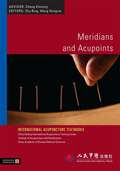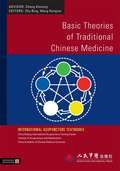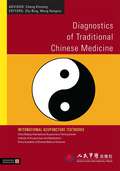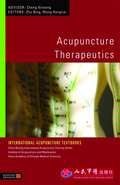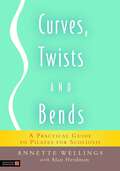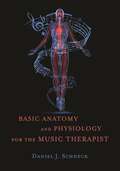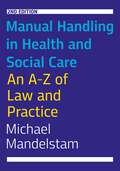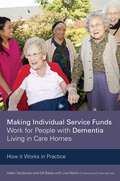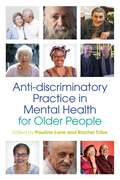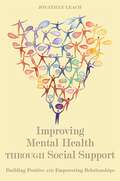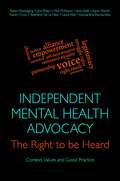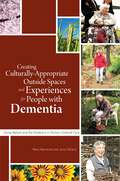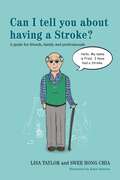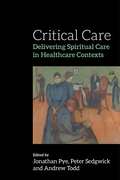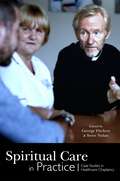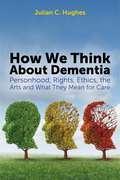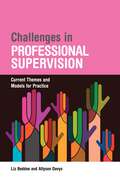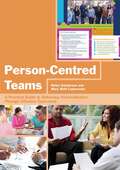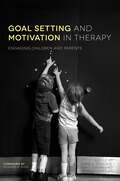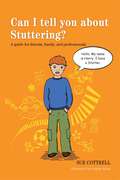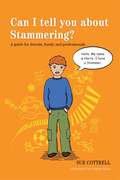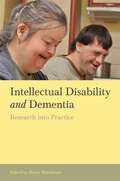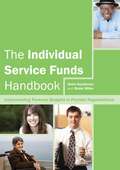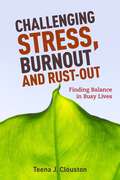- Table View
- List View
Meridians and Acupoints
by Hongcai Wang Bing ZhuAn in-depth understanding of the meridians and acupoints lies at the heart of effective practice in traditional Chinese medicine. This book outlines everything that practitioners and students need to know. The book explains how meridians relate to the major organs, where they are located in the body, and how they are linked to the healthy flow of Qi and blood. A large section of the book is devoted to descriptions of specific acupoints - their names, how to locate them, an introduction to the symptoms they can be used to treat, and how. Also included is a thorough introduction to the basics of acupuncture practice, including how to prepare a patient prior to treatment, how to insert and manipulate acupuncture needles, how and when to use moxibustion and cupping techniques, and what to do if treatment goes wrong. This useful and authoritative textbook, compiled by the China Beijing International Acupuncture Training Centre (CBIATC), under the editorial direction of leading Chinese clinicians Zhu Bing and Wang Hongcai, is essential reading for students of traditional Chinese medicine, and an excellent reference for acupuncture practitioners at all levels.
Basic Theories of Traditional Chinese Medicine
by Hongcai Wang Bing ZhuTraditional Chinese medicine has a long and complex history, yet the basic principles at the heart of practice have remained the same for hundreds of years. Without a solid understanding of these fundamental theories, effective practice is impossible, and this book provides a complete introduction to everything that students and practitioners, both new and experienced, need to know. The book describes and explains all of the fundamental principles of Traditional Chinese Medicine, including yin/yang, the five elements, the 'zang and fu' organs, Zang Xiang, Qi, and the meridians and collaterals of the body. Explaining not only the principles upon which these elements work, but also how they interrelate, the book describes how they can be used in practice to identify, treat and prevent ill-health and disease. This thorough and accessible textbook, compiled by the China Beijing International Acupuncture Training Center (CBIATC), under the editorial directorship of leading Chinese clinicians Zhu Bing and Wang Hongcai, is essential reading for students of traditional Chinese medicine, and is also a useful basic reference for TCM practitioners.
Diagnostics of Traditional Chinese Medicine
by Hongcai Wang Bing ZhuThe principles and practice of diagnostics are key to administering effective treatment in traditional Chinese medicine. The ability to recognise and diagnose symptoms and complaints correctly is fundamental to deciding on appropriate remedies, and this book provides a comprehensive introduction to all the principles that students and practitioners need to know. The authors outline the key methods used in diagnosis, and describe the eight basic categories of ailment and disease: yin and yang, exterior and interior, cold and heat, and deficiency and excess. They provide detailed instructions on how to identify and rebalance the relative strengths of pathogens and Qi in the body, and how to differentiate between syndromes that might look the same, using traditional Chinese medicine methods. The book concludes with useful forms for completion in taking a diagnosis. Combining practical instruction with detailed theory, this authoritative textbook, compiled by the China Beijing International Acupuncture Training Center (CBIATC), under the editorial direction of leading Chinese clinicians Zhu Bing and Wang Hongcai, is an excellent reference for students and practitioners at all levels.
Acupuncture Therapeutics
by Hongcai Wang Bing ZhuAcupuncture can be a very effective way of strengthening the body's resistance to illness, and of eliminating potentially harmful pathogens. This book provides a complete overview of the principles involved in distinguishing between different syndromes of illness in patients, and of selecting and administering appropriate treatments. The book describes the functions of acupuncture within the wider context of traditional Chinese medicine, and explains the principles involved in identifying and treating different illnesses and complaints. A large portion of the book is devoted to describing how to diagnose and treat more than 130 different conditions, including headaches and angina, asthma, depressive disorders, dementia, and acne. This comprehensive textbook, compiled by the prestigious China Beijing International Acupuncture Training Center (CBIATC), under the editorial directorship of leading Chinese practitioners Zhu Bing and Wang Hongcai, is an invaluable reference for the advanced student or practitioner of traditional Chinese medicine.
Curves, Twists and Bends: A Practical Guide to Pilates for Scoliosis
by Alan Herdman Annette WellingsWritten in response to the many requests for a practical and accessible guide to exercise for scoliosis sufferers, Curves, Twists and Bends combines the experience of Annette Wellings, who has major scoliosis, with that of Alan Herdman, the UK's leading Pilates teacher. This clear and concise book explains what scoliosis is, its symptoms, and its physical and psychological impact. It includes a series of Pilates exercises, designed by the authors specifically to promote flexibility, posture and muscle strength in scoliosis sufferers, and also vital information on what exercises to avoid. It offers basic strategies and practical tips for living with the condition, including useful advice on diet, rest, sitting, carrying and how to dress. Written with the full range of scoliosis sufferers in mind, Pilates for Scoliosis emphasises the importance and feasibility of gentle exercise for keeping the body as healthy and flexible as possible. Curves, Twists and Bends: A Practical Guide to Pilates for Scoliosis will be indispensible to individuals with scoliosis and their families as well as to physical therapists, Pilates instructors and other professionals who advise scoliosis patients on exercise and lifestyle options.
Basic Anatomy and Physiology for the Music Therapist
by Daniel J. SchneckProviding need-to-know information about the human body for music therapists, this book covers the elements of anatomy and physiology that are of particular relevance to clinical practice. Addressing both the structure and function of the human body, the material is presented with the music therapist in mind. Particular attention is paid to the role of music in affecting responses from the organ systems, including the senses, the endocrine glands, the immune system, the musculo-skeletal system, the nervous systems and the vestibular system. Dr Schneck also uses accessible musical metaphors to explain complex biological information. Emphasising the symbiotic relationship between music and the body, this book reveals how an understanding of this relationship can help music therapists to practice more effectively, and will be of interest to students and practitioners alike.
Manual Handling in Health and Social Care, Second Edition: An A-Z of Law and Practice
by Michael MandelstamManual Handling in Health and Social Care is written for all those involved in the manual handling of adults or children - including those carrying it out, assessors, managers and commissioners.It lays out the current legal requirements in a non-technical way and includes case studies illustrating the law applied in practice, across health, social care and sometimes educational settings. The book applies to England, Scotland, Wales and Northern Ireland. An extended introduction sets out challenges, past, present and future, including safety, balancing risk with duties to meet people's needs, human rights, avoidance of blanket policies, mental capacity, safeguarding, the limited resources of statutory services and single-handed care. It also considers some of the legal implications of increased use of technology (including remote assessment), as well as the "mechanisation" of care and its application to manual handling.The main part of the book is in the form of an A-Z guide, providing quick access to relevant legislation and common law (negligence) rules applying to personal injury cases. It covers also, extensively, judicial review legal challenges to decisions, when people and their families disagree with manual handing decisions that have been made. In addition, relevant ombudsman cases are included.The book will be essential reference for staff and managers in health and social care settings, students, legal professionals and all those working to ensure good practice and compliance with the law.
Making Individual Service Funds Work for People with Dementia Living in Care Homes: How it Works in Practice
by Helen Sanderson Gill BaileyDispelling the myths about how personalisation works for people with dementia living in care homes, this book demonstrates how to introduce Individual Service Funds (ISFs), what works and what doesn't, and how to deal with difficulties and setbacks. Individual Service Funds are one way that people living with dementia can have a personal budget. The authors explain how they went about introducing the principles of ISFs to people living with dementia in a large care home in Stockport, without using any additional funding. They describe the person-centred practices used and the involvement of the council, commissioners, staff and families. Through clear and detailed stories and examples, they demonstrate the dramatic approach to quality of life for people with dementia the approach can deliver. There is a strong emphasis on managerial and organisational issues, including getting staff 'on board', providing adequate support, budgeting, building effective partnerships and implementing change. Providing helpful insights and examples for good practice, this book is essential reading for all those involved in providing personalised care for people with dementia living in care homes, including care staff, care home managers, local authority commissioners, service providers and policy makers.
Making Individual Service Funds Work for People with Dementia Living in Care Homes: How it Works in Practice
by Helen Sanderson Gill BaileyDispelling the myths about how personalisation works for people with dementia living in care homes, this book demonstrates how to introduce Individual Service Funds (ISFs), what works and what doesn't, and how to deal with difficulties and setbacks.Individual Service Funds are one way that people living with dementia can have a personal budget. The authors explain how they went about introducing the principles of ISFs to people living with dementia in a large care home in Stockport, without using any additional funding. They describe the person-centred practices used and the involvement of the council, commissioners, staff and families. Through clear and detailed stories and examples, they demonstrate the dramatic approach to quality of life for people with dementia the approach can deliver. There is a strong emphasis on managerial and organisational issues, including getting staff 'on board', providing adequate support, budgeting, building effective partnerships and implementing change.Providing helpful insights and examples for good practice, this book is essential reading for all those involved in providing personalised care for people with dementia living in care homes, including care staff, care home managers, local authority commissioners, service providers and policy makers.
Anti-discriminatory Practice in Mental Health Care for Older People
by Rachel Tribe Ajit Shah Maria Castro Romero Matt Broadway-Horner Musthafar Oladosu Pauline Lane Peter Cockersell Rena Kydd-Williams Siobhan SpencerExploring the key issues around anti-discriminatory practice for professionals working in mental health services, this book looks at ways to improve the health and social care of older people from minority and excluded communities. The chapters explore the issues involved in working with individuals from a range of minority groups, such as LGBT people, people with learning disabilities, people from black and minority ethnic communities, homeless people and people with dementia. The chapters cover important theory and research into discrimination, ageing and identity. Contributions from experts in the fields of mental health and working with minority groups provide practical insights into developing anti-discriminatory practice.There is also practical advice on culturally appropriate support for carers, cultural competency in end of life care, working with interpreters, and celebrating diversity, accompanied by supporting practical resources. This comprehensive book will provide mental health practitioners and students with an essential understanding of anti-discriminatory practice.
Improving Mental Health through Social Support: Building Positive and Empowering Relationships
by Jonathan LeachSocial support is the everyday assistance offered by family, friends, neighbours and colleagues, as well as the foundations of support in a range of non-clinical settings, and plays a vital role in a person's mental health and wellbeing. This book examines the nature of social support and offers a practical approach to how it can be enhanced. Focusing on the relationships between service users and supporters , it examines service users' experiences of issues of identity, stigma, social exclusion and social networks. Individual chapters look in depth at how social support is enacted in close relationships, educational institutions and in the world of employment. The nature of 'community' is explored with particular reference to how service users can be supported into greater engagement with social networks. Demonstrating the importance of social perspectives on mental health, this book is essential reading for practitioners, students and educators in mental health, social and community work, community mental health nursing and occupational therapy.
Independent Mental Health Advocacy - The Right to Be Heard: Context, Values and Good Practice
by Karen Newbigging Konstantina Poursanidou Karen Machin Toby Brandon Stephanie De Haye Julie Ridley Laura Able Mick Mckeown Kaaren Cruse June Sadd Kris ChasteyIndependent mental health advocacy is a crucial means of ensuring rights and entitlements for people sectioned under the Mental Health Act. This book takes an appreciative but critical view of independent mental health advocacy, locating the recent introduction of Independent Mental Health Advocates (IMHAs) within a broader historical, social and policy context, and anticipates future developments. The text includes the voices of service users throughout, both as authors and research participants. Drawing on their research, the authors provide a historical overview of mental health advocacy, independent mental health advocacy in relation to the law, the role and responsibilities of IMHAs, essential values, knowledge and skills required of advocates, relationships with service providers, commissioning, measuring advocacy outcomes, and how IMHA services can be made accessible and appropriate to diverse groups. This will be essential reading for advocates, social work professionals, academic staff and trainers and will provide mental health professionals with an understanding of, and critical reflection on, the IMHA role. It will also be of particular general interest to survivors and mental health service users, and their families and carers.
Creating Culturally Appropriate Outside Spaces and Experiences for People with Dementia: Using Nature and the Outdoors in Person-Centred Care
by Judith Jones Inoue Jane Gilliard Mary Marshall James Mckillop Sidsel Bjorneby Beth Britton Gillian Maclean Kate Andrews Sarah Waller Margaret-Anne Tibbs Joan Domicelj Wendy Hulko Abigail Masterton HirokoDemonstrating that it is essential to be sensitive to the cultural backgrounds of people with dementia in order to provide truly person-centred care, this book shows that it is possible to create culturally appropriate outdoor spaces and experiences that resonate with people with dementia on a fundamental level and are a source of comfort and wellbeing. Contributors drawn from a variety of backgrounds describe the significance of nature in the lives of people with dementia from diverse cultures, faiths, traditions and geographical locations, providing helpful insights into how access to the natural world may be achieved within different care settings. There are contributions from the UK (Scottish island, urban North East England and Norfolk farming communities), Canada, Norway, Japan, Australia, Sudan and South Africa, as well as a chapter on the specific difficulty of providing access to nature for people with dementia in hospitals. The voices of people with dementia and their carers are prominent throughout, and the book also contains evocative poetry and photographs of people with dementia enjoying nature and the outdoors in different contexts. A rich source of information and ideas for all those interested in creating culturally appropriate outdoor spaces and experiences for people with dementia, including dementia care practitioners, especially those at managerial level, policy makers, commissioners and those involved in designing and commissioning buildings and services.
Can I tell you about having a Stroke?: A guide for friends, family and professionals
by Lisa Taylor Swee Hong Chia Katie StantonMeet Fred - a man who has had a stroke. Fred invites readers to learn about what it is like to have a stroke from his perspective, helping them to understand the challenges faced by someone who has had a stroke and the ways in which they might have to adapt their lifestyle. He also gives advice on how to offer support to someone who has had a stroke, from diagnosis through to rehabilitation. With illustrations throughout, this useful book will be ideal for anyone who knows someone who has had a stroke, from child to adult. It will help readers to understand and explain what a stroke is and encourage open discussion among family members, carers and friends.
Critical Care: Delivering Spiritual Care in Healthcare Contexts
by Debbie Hodge Peter Sedgwick Steve Nolan Jonathan Pye Julian Raffay Karen Mackinnon Layla Welford Charles Thody Hamish Ferguson-Stuart Stephen Flatt Anne Mccormick Rodney Baxendale Mirabai Galashan Mark Clayton Andrew Todd Richard WhartonProviding a bridge between research in healthcare and spirituality and practitioner perspectives, these essays on chaplaincy in healthcare continue dialogue around constructing, negotiating and researching spiritual care and discuss the critical issues in chaplaincy work, including assisted suicide and care in children's hospices. Each section of the book is introduced by an academic theologian, giving the book a strong theoretical base, before serving healthcare chaplains offer their perspectives and experiences with material drawn from practice in a broad spectrum of healthcare contexts. The integration of theory and practical application in these essays will be of interest to chaplains, healthcare practitioners, and students of theology and healthcare.
Spiritual Care in Practice: Case Studies in Healthcare Chaplaincy
by David Mccurdy David Mitchell John Swinton Steve Nolan Rosie Andrious-Ratcliffe Angelika Zollfrank Richard C Weyls Wes Roberts Daniel H Grossoehme Sian Cotton Alister W Bull Katherine M Piderman Barbara Pesut Graeme Gibbons Christina Puchalski George Fitchett Jim Huth Warren Kinghorn Chris Swift Alice Hildebrand Nina RedlThese diverse case studies make a compelling case for the importance of effective spiritual care in healthcare and provide unprecedented insight into the essential role of the chaplain within the healthcare team. Presented alongside critical reflections and responses from professionals within chaplaincy, psychology, psychiatry and nursing, they provide an honest and detailed look into how healthcare chaplains actually work with the people in their care and reveal the vital role of narrative and imagination in effective transformative practice. From a 16-year-old with a belief that God would enable a miraculous recovery from paralysis, to an African man with a history of psychosis and depression whose cultural belief in witches complicated his treatment, to a dying Jewish man, aggressive and isolated due to his traumatic life experiences, each case includes insight into the patient's needs and chaplain's perspectives, discussion of spiritual assessments and spiritual care interventions, and accounts of significant encounters and dialogues. The nine paediatric, psychiatric and palliative case studies and reflections in this ground-breaking book will enable chaplains to critically reflect on the spiritual care they provide and communicate their work more effectively, help healthcare professionals develop a clearer understanding of the care chaplains deliver, and provide an informed perspective for those who develop policy around spiritual care and need to make the case for chaplaincy services.
How We Think About Dementia: Personhood, Rights, Ethics, the Arts and What They Mean for Care
by Julian C. HughesExploring concepts of ageing, personhood, capacity, liberty, best interests and the nature and ethics of palliative care, this book will help those in the caring professions to understand and engage with the thoughts and arguments underpinning the experience of dementia and dementia care. Dementia is associated with ageing: what is the significance of this? People speak about person-centred care, but what is personhood and how can it be maintained? What is capacity, and how is it linked with the way a person with dementia is cared for as a human being? How should we think about the law in relation to the care of older people? Is palliative care the right approach to dementia, and if so what are the consequences of this view? What role can the arts play in ensuring quality of life for people with dementia? In answering such questions, Julian Hughes brings our attention back to the philosophical and ethical underpinnings of dementia care, shedding new light on the significance and implications for those in the caring professions, academics and researchers, and those living with dementia and their families.
Challenges in Professional Supervision: Current Themes and Models for Practice
by Allyson Davys Liz BeddoeChallenges in Professional Supervision draws on the latest research and theory to explore issues, trends and developments in supervision work. The provision of excellent supervision is strongly linked to improved performance and staff retention. In this book, supervision is examined across a broad range of settings, addressing concerns common to a range of professions, including health, social work and counselling. The book is divided into two sections: the first describes the contemporary themes in professional supervision and the second discusses the models and skills being employed to deliver it. Issues such as supervising ethically, practitioner wellbeing and managing the process are all explored. There are also chapters on group supervision, supervision of managers and how to have difficult conversations. This book is ideal for managers and senior practitioners in health and social care with an active interest in developing, energising and inspiring their supervision practice, as well as academics interested in keeping up-to-date with developments in the field.
Person-Centred Teams: A Practical Guide to Delivering Personalisation Through Effective Team-work
by Helen Sanderson Mary Beth LepkowskyPerson-Centred Teams provides much-needed guidance on person-centred working following the roll out of personalisation and personal budgets across health and social care. In order to deliver personalisation you need to work with staff in person-centred ways. Straightforward and easy-to-read, this practical guide describes how to do this by developing a person-centred team using person-centred practices. The authors outline their model for developing a team, and how information is recorded in a person-centred team plan. They explain: Purpose - how to clarify a team's purpose People - what managers need to know about each team member, and how one-page profiles can help Performance - how to clarify service users' expectations of a team's services, and assess whether or not these are being met Process - how person-centred practices can aid teamwork and help your team deliver Progress - how to continuously improve teamwork and performance Each section features clear illustrations and examples from teams to enable you to develop a person-centred team plan and work together in person-centred ways. This guide is essential reading for service providers, managers, practitioners and students in the health and social care fields, as well as person-centred planning coordinators and user-led organisations.
Goal Setting and Motivation in Therapy: Engaging Children and Parents
by Judy Jones Sylvia Rodger Richard Ryan Jenny Ziviani Monica Cuskelly Kirsty Stewart Helene Polatajko Margaret Wallen Nancy Pollock Cheryl Missiuna Anne Poulsen Leanne Sakzewski Pam Meredith Jennifer Siemon Jessica Kramer Gillian King Mary Law Bronwyn Hemsley Mary Muhlenhaupt Fiona Graham Rose Gilmore Amanda Kirby Niina Kolehmainen Lynne Peters Marjon Ten Velden Benita PowrieDrawing together motivational theory, research-based evidence and guidance for best practice, this book presents innovative models for goal-setting and goal pursuit in therapy with children. Setting goals not only allows children, and their families, to engage with the overall therapeutic process, but it also provides an essential motivational element throughout the entire therapeutic process. The editors and contributors give practical advice on empathically collaborating with the child and his or her family, to clearly identify achievable goals that can be wholeheartedly pursued. Key information on Self-Determination Theory (SDT) is accessibly explained, which will aid professional understanding of the relationship between motivation, goal-setting, and strong therapeutic practice. The approaches in this book can be used by a wide range of professionals, including those who specialise in working with children with physical disabilities, learning disabilities, and emotional and behavioural difficulties. The combination of theory, research and practical advice makes this book an essential resource for professionals working therapeutically with children, including occupational therapists, speech and language therapists, physiotherapists, counsellors, psychologists, social workers, arts therapists and psychotherapists.
Can I tell you about Stuttering?: A guide for friends, family and professionals
by Sophie Khan Sue CottrellMeet Harry - a young boy who stutters. Harry invites readers to learn about what it is like to stutter from his perspective and how it affects his daily life and makes him feel. He talks about techniques that can help reduce stuttering and describes how friends, family and others can help him to feel at ease and reduce his stutter further. This illustrated book is full of useful information and will be an ideal introduction for young people, aged 7 upwards, as well as parents, friends, teachers and speech therapists working with children who stutter. It is also an excellent starting point for group discussions at home or school.
Can I tell you about Stammering?: A guide for friends, family and professionals
by Sophie Khan Sue CottrellMeet Harry - a young boy who stammers. Harry invites readers to learn about what it is like to stammer from his perspective and how it affects his daily life and makes him feel. He talks about techniques that can help reduce stammering and describes how friends, family and others can help him to feel at ease and reduce his stammer further. This illustrated book is full of useful information and will be an ideal introduction for young people, aged 7 upwards, as well as parents, friends, teachers and speech therapists working with children who stammer. It is also an excellent starting point for group discussions at home or school.
Intellectual Disability and Dementia: Research into Practice
by David Thompson Philip Mccallion Irene Tuffrey-Wijne Heather Wilkinson Chris Bigby Noelle Blackman Michael Splaine Liam Wilson Shahid H. Zaman Karen Watchman Evelyn Reilly Niamh Mulryan Moni Grizzell Antonia Mw Coppus Matthew P Janicki Tony Holland Andre Strydom Karen Dodd Mary Mccarron Rachel Carling Jenkins Teresa Iacono Sunny Kalsy Trevor Chan Ken Courtenay Nicolle Eady Amanda Sinai Nancy Jokinen Susan Benbow Leslie Udell Tiina Annus Andrew GriffithPresenting the most up-to-date information available about dementia and intellectual disabilities, this book brings together the latest international research and evidence-based practice, and describes clearly the relevance and implications for support and services Internationally renowned experts from the UK, Ireland, the USA, Canada, Australia and the Netherlands discuss good practice and the way forward in relation to assessment, diagnosis, interventions, staff knowledge and training, care pathways, service design, measuring outcomes and the experiences of individuals, families and carers. The wealth of information offered will inform support and services throughout the whole course of dementia, from diagnosis to end of life. Particular emphasis is placed on how intellectual disability and dementia services can work collaboratively to offer more effective, joined up support. Practitioners, managers and commissioners will find this to be an informative resource for developing person-centred provision for people with intellectual disabilities and dementia and their families. It will also be a key text for academics and students who wish to be up-to-date with the latest research and practice developments in this field.
The Individual Service Funds Handbook: Implementing Personal Budgets in Provider Organisations
by Robin Miller Helen SandersonThe Individual Service Funds Handbook is the definitive guide to one of the most innovative forms of personal budget in health and social care. It gives a clear explanation of what Individual Service Funds (ISFs) are, how to use them effectively and includes all the information you need in order to implement them in your organisation. The Handbook spans a range of settings, including a dementia care home, supported living and residential homes for adults with learning disabilities and people who use mental health services. It also sets out guidelines and templates which can be used when implementing ISFs, addressing key practical concerns including: how to put together effective support plans, and how to ensure that ISFs are delivered in a person-centred way, how to overcome organisational complexities in implementation and supporting managers. A one-stop resource for anyone wanting to understand the potential of ISFs, the Handbook is required reading for service providers, commissioners, and those engaged in person-centred practice and personalisation, including user-led organisations.
Challenging Stress, Burnout and Rust-Out: Finding Balance in Busy Lives
by Teena J. CloustonA balanced lifestyle enhances health, happiness and wellbeing. With practical techniques and strategies, this book explores how this balance can be found and how stress and anxiety, which are linked to being overworked and over busy, may be alleviated. It begins by examining the state of work-life imbalance in our everyday lives and discussing real life examples from a group of professionals working in health and social care. Their stories and experiences illustrate the problems caused by our modern, work-driven society and resonate with how many of us are living today. The author then provides practical tools and techniques to address this overwork culture and achieve a more balanced lifestyle. These simple, yet effective, strategies can be implemented quickly in everyday life. This practical resource addresses a problem affecting many professionals worldwide. It will be of particular interest to helping professionals, including occupational therapists, counsellors and therapists, and will allow them to apply the theories of work-life balance to real life in straightforward and tangible ways. The stories and techniques will also resonate with anyone interested in transforming their overworked or overburdened lives.
